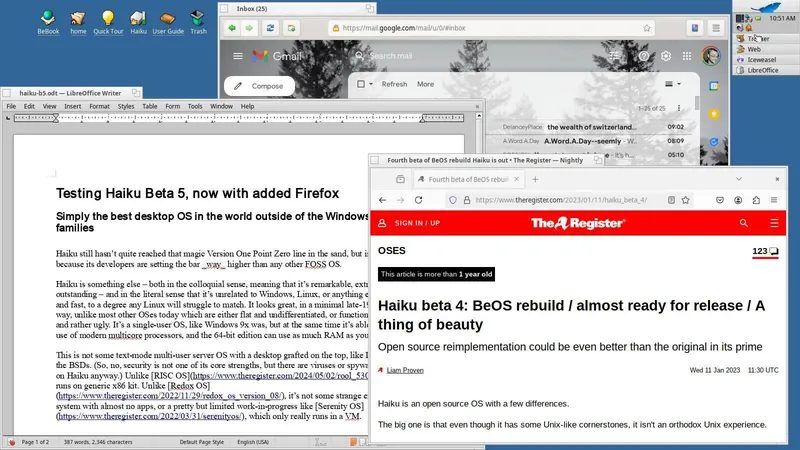
Haiku Beta 5: A Leap Forward with Firefox Integration and Enhanced Features!
2025-01-09
Author: Wei Ling
Haiku, the open-source operating system that pays homage to the now-defunct BeOS, is still on its journey towards reaching that coveted Version 1.0 milestone. Developers have set an ambitious standard for this experimental OS, so progress has been methodical but meaningful.
In September, Haiku Beta 5 was unveiled, but it wasn't until December that users received a significant bonus: an unofficial yet functional port of the Firefox browser, traded under the name Iceweasel in the Haiku Depot. This addition brings a new level of versatility to users eager for a modern browsing experience.
What’s New in Beta 5?
Those keeping close tabs on Haiku will recognize its gradual evolution. The latest beta features a host of improvements and minor new additions, indicating that the operating system is inching ever closer to being a daily-use platform. Yet, this slow pace is reflective of the small but dedicated development team behind it.
Among noticeable upgrades is the OS's handling of color within the user interface. Haiku now makes it easier than ever to set contrasting colors for different elements with just a few adjustments to a user's main three color choices. For example, if users choose a dark background, the system automatically adapts to a dark mode, adding to its aesthetic appeal. Both the terminal emulator and icon editor have undergone substantial enhancements. The Tracker file manager, a nod to nostalgic BeOS users, now visually distinguishes read-only drives, disabling write functions intuitively.
In terms of performance enhancements, networking capabilities have seen a significant boost, with TCP/IP support reportedly ten times faster than before. VPN functionality is now possible thanks to TUN/TAP support. Improved power management is also a boon, evident when Haiku automatically launches a battery monitoring app on devices with battery capabilities, enhancing usability for laptops.
New filesystem support is noteworthy: the previously outdated FAT driver has been swapped with a more modern FreeBSD counterpart, crucial for managing EFI System Partitions in today’s UEFI computers. Moreover, Haiku can now read FreeBSD UFS partitions and supports USB audio devices, further broadening its compatibility.
For developers, Beta 5 brings experimental support for .NET Core versions 8 and 9, along with improvements to the FLTK GUI toolkit. Contributing to a smoother development experience, updates to the GNU debugger GDB, the strace API, and POSIX compliance round out the back-end improvements.
What is Haiku?
Haiku stands out in the operating systems landscape. It eschews traditional multi-user, server-oriented designs found in many Linux distributions in favor of a sleek, integrated desktop experience reminiscent of the late 1990s. While it has a terminal emulator available for those who require it, much of the functionality is centered around a graphical interface that simplifies everyday tasks.
Born out of the legacy of Be, Inc.'s BeOS, Haiku is intriguing because it draws from 20th-century design paradigms while leveraging modern hardware capabilities. It runs efficiently on both 32-bit machines and modern 64-bit systems, making it accessible for a wide range of users. While it may lack some features typical of contemporary operating systems, such as robust cloud service integration or extensive commercial software, its lightweight nature allows it to operate smoothly on less demanding hardware.
Beta 5 appears remarkably stable, with users reporting fast performance and minimal crashes. It also comes equipped with an "app store," HaikuDepot, which boasts over 4,300 packages informed by the needs of its user base. Popular applications like VLC media player and the latest LibreOffice suite are at users’ fingertips, while Iceweasel enhances web browsing for those wanting more than Haiku's built-in web browser, WebPositive.
While Haiku may not yet serve as a direct replacement for mainstream Linux distributions, it represents a strong alternative for users whose needs align with what it offers. The direction of development hints that Haiku is fast approaching a day when it could serve as a reliable operating partner in a variety of settings. So if you're looking for something different, give Haiku a try—it might just surprise you!



 Brasil (PT)
Brasil (PT)
 Canada (EN)
Canada (EN)
 Chile (ES)
Chile (ES)
 Česko (CS)
Česko (CS)
 대한민국 (KO)
대한민국 (KO)
 España (ES)
España (ES)
 France (FR)
France (FR)
 Hong Kong (EN)
Hong Kong (EN)
 Italia (IT)
Italia (IT)
 日本 (JA)
日本 (JA)
 Magyarország (HU)
Magyarország (HU)
 Norge (NO)
Norge (NO)
 Polska (PL)
Polska (PL)
 Schweiz (DE)
Schweiz (DE)
 Singapore (EN)
Singapore (EN)
 Sverige (SV)
Sverige (SV)
 Suomi (FI)
Suomi (FI)
 Türkiye (TR)
Türkiye (TR)
 الإمارات العربية المتحدة (AR)
الإمارات العربية المتحدة (AR)